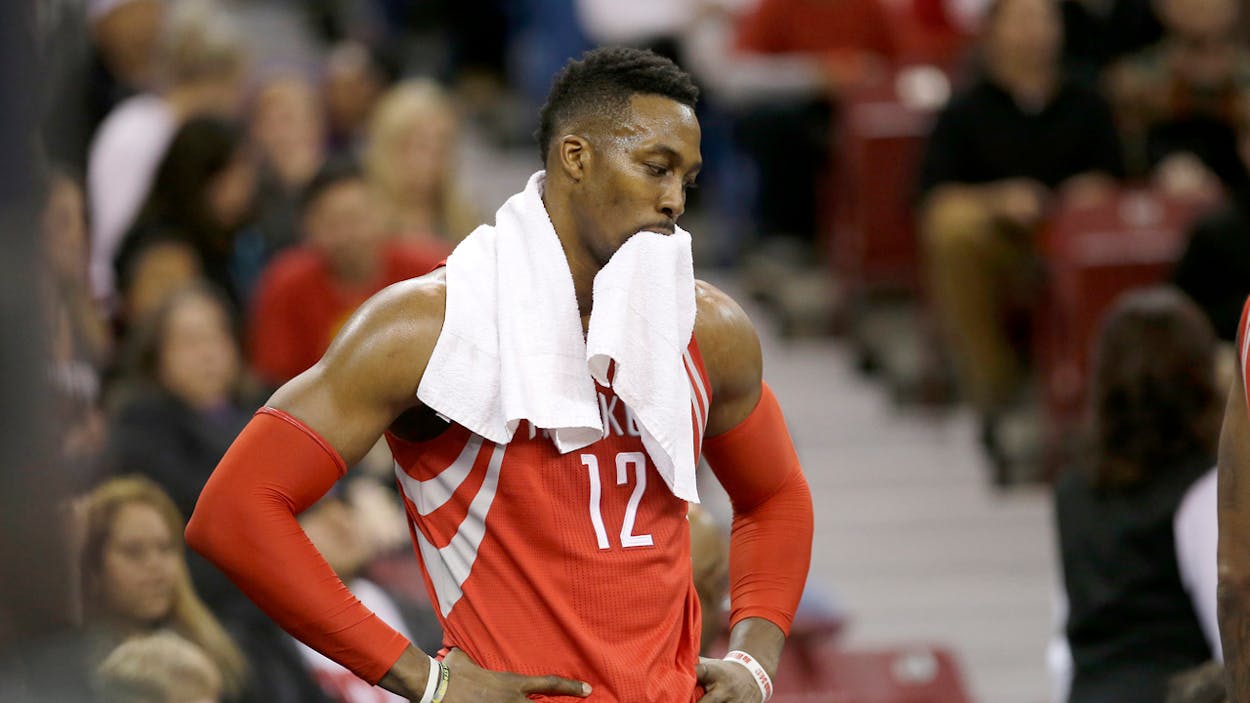On July 2, 1965, United Press International sportswriter Milton Richman wrote a short item about Wilt Chamberlain, titled “Is Wilt Unhappy in His Work?” In it, Richman alleges that the skyscraping Warriors wonder didn’t appreciate a fine that had been handed down to him from the NBA—a whopping $750—and might retire from basketball to escape the penalty. Moreover, he didn’t feel like he could “show his true individual ability.”
Sound familiar? Swap out the name and adjust Chamberlain’s fine for inflation, and “unhappy big man” is a ubiquitous descriptor in the annals of NBA history. Shaquille O’Neal wanted top billing over Kobe Bryant in Los Angeles, reportedly yelling “Pay me!” at then-Lakers owner Jerry Buss during a 2003-04 season game. The geniuses/monsters who write headlines for the New York Post once called Knicks center Patrick Ewing “Baby Ewie” on its oft-savage back cover after Ewing called for the ball more. DeAndre Jordan left the Clippers for the Mavericks this summer, unhappy with playing time and constant upbraiding at the hands of Chris Paul, only to reverse course days later in the wake of Emoji-Gate.
The scarcity of riches at the center position—you have to be a pituitary mutant to even qualify—leads to skyrocketing demand whenever one becomes unhappy, and thus, available. Most recently, that was the Rockets’ Dwight Howard, who, if you believe what you read online, might be available yet again.
Howard arrived in Houston as the most coveted free agent signing of the 2013 offseason, spurning the Lakers just one year after Los Angeles traded for him. The signing was significant for a number of reasons: the $30 million Howard left on the table in signing with a new team, the fact that free agents historically don’t walk away from L.A., and, for Rockets fans, a game-changing center coming to Houston for the first time since an unhappy Hakeem Olajuwon was jettisoned to Toronto in 2001.
The only problem? Howard has never truly been happy on an NBA team for very long. He frowned his way out of Orlando, after allegedly demanding that longtime Magic coach Stan Van Gundy be fired (he eventually was), and he turned down an extra comma on his overall $88 million deal to escape from L.A. How long would it take before he soured on the Rockets?
That moment has come after just two years and change, according to longtime NBA writer Chris Sheridan, writing last week that Howard is “extremely unhappy in Houston playing second fiddle to alpha dog James Harden” and that the Rockets would likely trade him before the season was over.
When asked about this report following the next Rockets game, Howard shot back that these were “lies and rumors,” to which Sheridan doubled down, calling his story fact, not rumor. J.B. Bickerstaff, who took over for former coach Kevin McHale after the Rockets fired him just eleven games into this season, also disagrees with Sheridan, contending that Howard is happy where he is. Regardless, this is a story now that will follow the Rockets for the rest of this season or until they trade Howard, whichever comes first.
One thing to understand is that Howard is maligned in NBA circles. To writers and stat geeks, he’s wasted potential, regressing quickly in his prime. To coaches, he’s a menace, and they usually don’t last long when Howard is involved. His former teammate Kobe Bryant called him “soft”—essentially the worst invective you can hurl at someone who plays a position typically reserved for tough, physical players—and Kevin Garnett was suspended after head-butting him last season.
Howard even dug deep a couple years ago, griping that his old Magic team didn’t retire his number 12. Even after he forced his way out of town, he still demanded the respect he’s never quite given any situation he’s been in.
As superstar centers before him have repeatedly griped over playing time, usage, contracts, and being selected by the 76ers, their names splashed all over the tabloids as “unhappy” and “disgruntled,” it’s true that there’s only one true elixir to cure clubhouse cancer: winning. Unfortunately for Howard and the Rockets, this midseason turnaround of sorts might be too late; the disease metastasized and the potion bottle is bone dry.
As for Chamberlain, Richman wrote that the most gifted player the NBA had seen to that point could be summed up in a quote he’d overheard: “How can this guy hope to become a fighter when every time you touch him he yells ’foul!’” Apparently Chamberlain deigned to fight Cassius Clay, his mind removed from the team sport in which he was under contract to play.
While Howard has made no claims to swap the shorts for trunks, he may share a similar cosmic fate with his seven-foot-one predecessor. Seemingly fed up with Chamberlain’s vocal unhappiness, the Warriors traded him away just months later. Warriors owner Frank Mieuli explained that the city’s fans never embraced Chamberlain, despite his transcendent talent, saying that “most fans are for the little man, the underdog, and Chamberlain is neither.” According to Mieuli, fans used to come out in droves to root against Chamberlain, the towering, rich lothario for whom history has been less than kind.
A handsome linebacker on stilts with a low-single-digit body fat percentage, Howard has been and will similarly remain Goliath, squarely in the crosshairs for the rest of his career based on his vocal displeasure at every stop. Now it’s just a matter of how hard he falls, and if the Rockets care enough to be there to catch him when he does.






